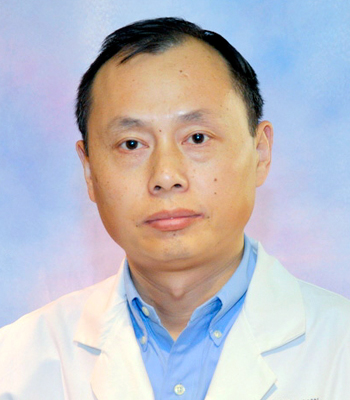Guojun Wu
Position Title
Associate ProfessorBasic Science
Office Location
Hudson-Webber Cancer Research Center, Rm. 824Mailing Address:
Karmanos Cancer Institute
4100 John R.
Mail Code: HW08AO
Detroit, MI 48201
Office Phone
313-576-8349Office Fax
313-576-8029Education Training
Education
(1995-1998) Ph.D., Genetics, Fudan University, Shanghai, P.R. China
(1992-1995) M.S. Genetics, Nanjing Railway Medical College, Nanjing, Jiangsu Province, P.R. China
(1983-1986) B.S. Biology, Huizhou Normal College, Anhui Province, P.R.China
Postgraduate Training
(2001-2006) Postdoctoral Research Fellow, the Johns Hopkins University
(1998-2001) Postdoctoral Research Fellow, Mayo Clinic
Professional Experience
Faculty Appointments
(2014-Present) Associate Professor, Molecular Therapeutics Program, Karmanos Cancer Institute and Department of Oncology, Wayne State University School of Medicine, Detroit, MI
(2006-2014) Assistant Professor, Molecular Therapeutics Program, Karmanos Cancer Institute and Department of Oncology, Wayne State University School of Medicine, Detroit, MI
Hospital or Other Professional Appointments
(2006-Present) Member, Karmanos Cancer Institute
Major Professional Societies
American Association for Cancer Research (AACR)
American Society of Human Genetics (ASHG)
Honors and Awards
(1998) C.C.Tan Jiuyuan Scholarship, (National scholarship in Bioengineering, named by the American foreign academic member C.C.Tan), Fudan University, Shanghai, P.R.China
(1997) Outstanding Research Presentation, Research tribune of Ph.D students, Fudan University, Shanghai, P.R.China
(1997) Dong's orient scholarship, (First class scholarship Top 5 in the graduate School) Fudan University, Shanghai, P.R.China
(1996) Dong's orient scholarship, (First class scholarship Top 5 in the graduate school) Fudan University, Shanghai, P.R.China
Courses taught
CB 7210: Fundamentals of Cancer Biology
CB 7220: Molecular Biology of Cancer Development
CB 7240: Priciples of Cancer Therapy
CB 7300 F31: Special Topics in Cancer Biology - Grant Writing
CB 7460: Mechanisms of Neoplasia - Alterations to Cellular Signaling
MGG 7010: Molecular Biology and Genetics
PSL 6300: Biotechnology - Techniques and Applications
Research Interests
My long-term research goals as an independent investigator are to (1) uncover the molecular mechanisms underlying human breast cancer's initiation, progression, and metastasis and (2) identify a novel therapeutic approach to targeting malignant breast cancer. To this end, my laboratory at Wayne State University follows two research directions:
1) Functional study of metastatic promoting genes in EMT, chemoresistance and stemness traits.
We are developing novel genetic or epigenetic approaches to identify breast cancer metastasis related genes and generate transgenic and knockout mouse models to study the functional role of critical driving genes in the development of mammary gland and breast cancer metastasis. We are also interested in investigating the interaction between stromal cells and cancer cells under the therapeutic condition, and intend to study the secretome responsive for both acquired tumor chemoresistance and aggressive growth pattern and metastasis.
2) Development of novel iPSCs techniques and exploration of a cell converting therapy to treat malignant breast cancer.
We aim to develop novel iPSCs techniques with high converting efficiency. We will perform comprehensive analysis of the generated iPSCs from different epithelial cells and malignant breast cancer cells, and ensure the malignant properties of these cells are maximally removed. We will intensively study the bystander effect and tropism effect of mammary-specific iPSCs and to explore their therapeutic and early detection applications. In addition to disease treatment, this technology may provide personalized biomaterials to study oncogenesis of cancers and other human diseases, as well as for drug screen to develop new drugs.
Publications
1. Meng F, Speyer CL, Zhang B, Zhao Y, Chen W, Gorski DH, Miller FR, Wu G. PDGFRα and β play critical roles in mediating Foxq1-driven breast cancer stemness and chemoresistance.Cancer Res. 2015 Feb 1;75(3):584-93. http://www.ncbi.nlm.nih.gov/pubmed/25502837
2. Meng F, Wu G.. The rejuvenated scenario of epithelial-mesenchymal transition (EMT) and cancer metastasis. Cancer and Metastasis Reviews. 2012; 31(3-4):455-67.http://www.ncbi.nlm.nih.gov/pubmed/22733307
3. Zhang H, Meng F, Wu S., Kreike B., Chen W., Sethi S., Miller FR, Wu G.. Engagement of I-branching β-1, 6-N-acetylglucosaminyltransferase GCNT2 in Breast Cancer Metastasis and Transforming Growth Factor-β Signaling. Cancer Res., 2011; 71(14):4846-56.http://cancerres.aacrjournals.org/content/71/14/4846.full.pdf+html
4. Meng F, Zhang H, Liu G, Kreike B., Chen W., Sethi S., Miller FR, Wu G.. P38gamma mitogen-activated protein kinase contributes to oncogenic properties maintenance and resistance to poly (ADP-ribose)-polymerase-1 inhibition in breast cancer. Neoplasia, 2011 ;13(5):472-82.http://www.ncbi.nlm.nih.gov/pmc/articles/PMC3084624/
5. Zhang H, Meng F, Liu G, Zhang B, Zhu J, Wu F, Ethier SP, Miller FR, Wu G.. Forkhead Transcription Factor Foxq1 Promotes Epithelial-Mesenchymal Transition and Breast Cancer Metastasis. Cancer Res., 2011; 71(4):1292-01.http://cancerres.aacrjournals.org/content/71/4/1292.long
6. Zhang H., Chen D., Ringler J, Chen W, Cui Q, Ethier SP, Dou QP., Wu G.. Disulfiram Treatment Facilitates PI3K Inhibition in Human Breast Cancer Cells In Vitro and In Vivo. Cancer Res., 2010; 70(10):3996 4004. http://cancerres.aarcjournals.org/content/70/10/3996.full.pdf+html
7. Zhang H., Liu G., Dziubinski M., Yang Z., Ethier SP., Wu G.. Comprehensive analysis of oncogenic properties of PIK3CA Mutations in breast cancer. Breast Cancer Res Treat. 2008; 112(2):217-27. http://link.springer.com/article/10.1007%2Fs10549-007-9847-6
8. Zhou S, Kachhap S, Sun W., Wu G., Chuang A., Poeta L., Grumbine L., Mithani S., Chatterjee A., Koch W., Westra W., Maitra A., Glazer C., Garducci M., Sidransky D., Mcfate T., Verma A., Califano J.. Frequency and phenotypic implications of mitochondrial DNA mutations in human squamous cell cancers of the head and neck. Proc Natl Acad Sci U S A., 2007; 104(18):7540-5. http://www.ncbi.nlm.nih.gov/pmc/articles/PMC1863503/
9. Wu G., Guo Z., Chang X., Kim M., Nagpal J., Liu J, Maki JM., Kivirikko KI., Trink B., Sidransky D.. LOXL1 and LOXL4 are epigenetically silenced by hypermethylation and can inhibit RAS / ERK signaling pathway in human bladder cancer. Cancer Res., 2007; 67(9):4123-9.http://cancerres.aacrjournals.org/content/67/9/4123.long
10. Wu G., Guo Z., Chatterjee A., Huang X., Mambo E., Osada M., Rubin E., Sukumar S., Sidransky D., Trink B. Overexpression of glycosylphosphatidylinositol (GPI) transamidase subunits phosphatidylinositol glycan class T and/or GPI anchor attachment 1 induces tumorigenesis and contributes to invasion in human breast cancer. Cancer Res., 2006; 66(20):9829-36. http://cancerres.aacrjournals.org/content/66/20/9829.long
